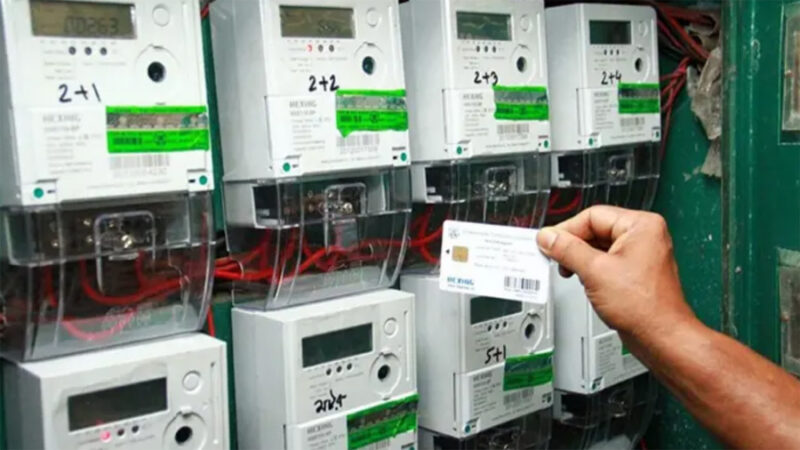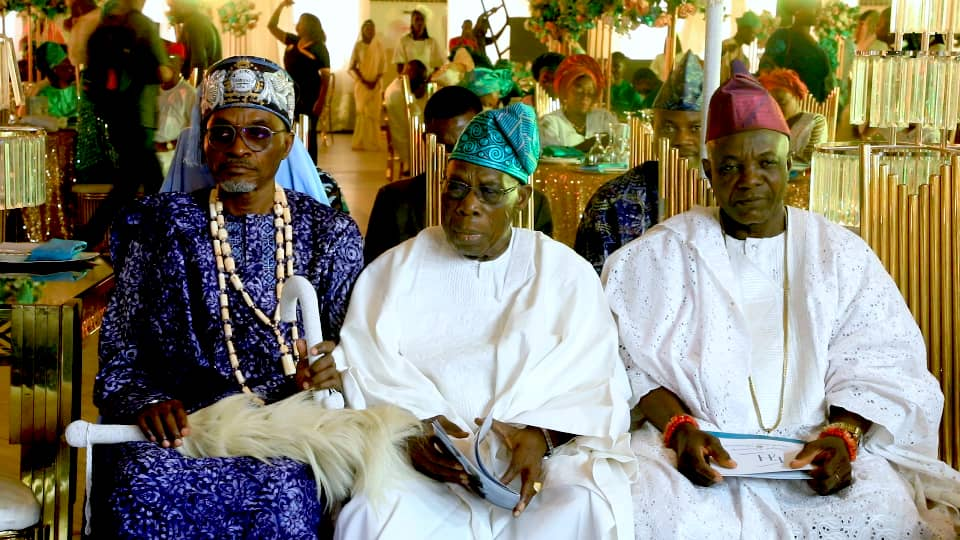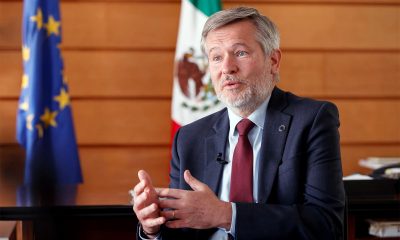Uncategorized
85.2% households in Nigeria still on estimated electricity billing – NBS

Electricity Tariff: 85.2% of households in Nigeria are still on estimated billing – NBS
A new report by the National Bureau of Statistics (NBS) reveals that 85.2% of Nigerian households still rely on the estimated billing model for electricity tariffs.
The findings were published in the Nigeria Residential Energy Demand-Side Survey Report 2024 released by the Bureau on Wednesday.
According to the report, only 14.8% of households use the prepaid billing system during the period under review.
The survey, which focuses on nine states across the six geopolitical zones — Southwest, Southeast, South-south, Northwest, Northeast, and North-central — further indicates that households receive an average of 6.6 hours of electricity per day. This is significantly lower than the 20-hour target for Band A customers, who, according to regulators, account for 15% of electricity consumers.
The report examines various states across Nigeria, including Oyo in the Southwest, Enugu in the Southeast, Bauchi in the Northeast, Kwara in the North-Central region, Akwa Ibom in the South-South, and Sokoto in the Northwest, among others.
READ ALSO:
- Canada to announce reduction in immigration levels today
- Blinken heads to Hamas mediator Qatar on Gaza truce push
- Lagos govt incurs ₦114.5b from 6,047 court cases
A deeper state-level analysis of the estimated billing system highlights Bauchi State as having the highest proportion of users under this system, recording 97.9%.
Sokoto State follows closely with 97.3%, while Plateau State reported the lowest rate of reliance on estimated billing at 69.1%.
Conversely, the pre-paid billing system showed a different pattern. Plateau State had the highest adoption of prepaid meters, with 30.9% of consumers utilizing this system, followed by Oyo State at 27.6%.
Bauchi State, which predominantly uses the estimated billing system, recorded the lowest adoption of prepaid meters, with just 2.1% of its residents using them.
The report also provides insights into the average electricity expenses incurred by households across the country. On average, a household spends an estimated N4,155.8 per month on electricity.
Further analysis by state reveals that Enugu State reported the highest average monthly electricity expenditure at N7,319.4, followed by Plateau State at N6,153.6, while Bauchi State recorded the lowest with N2,647.7.
Additionally, among households with access to solar electricity across the surveyed states, 90.9% utilized solar home systems, while 9.1% relied on solar mini-grids during the reference period.
Electricity Tariff: 85.2% of households in Nigeria are still on estimated billing – NBS
Uncategorized
Abeokuta shuts down as dignitaries gather for wedding of Yemi Kolapo’s daughter

Abeokuta shuts down as dignitaries gather for wedding of Yemi Kolapo’s daughter
Obasanjo, Emir Sanusi, Top Generals, Politicians, Media Icons, Nollywood Stars Grace Grand Celebration

The ancient city of Abeokuta stood still on Saturday, August 23, 2025, as a constellation of Nigeria’s most influential figures converged for the Nikkah (wedding) of Faizah Omoteniola Kolapo, daughter of Dr. Yemi Kolapo, Publisher of The Point Newspaper and Iya Sunnah of Egbaland, and AbdulHakeem Jimoh, son of retired military officer, Brig. Gen. Olanrewaju Jimoh.
A celebration of love and legacy

The beautifully adorned marquee of the Olusegun Obasanjo Presidential Library served as the venue for the grand affair. The event attracted guests from across the country and beyond, paying tribute to the philanthropic legacies of both families, according to a report by Freedomonline.
Dr. Kolapo, who is also President of the Media Transformation and Empowerment Foundation and Ameerah General of Ogun State, received high praise for her impact in media and religious spheres.
The groom’s father, Brig. Gen. Jimoh (rtd), was equally celebrated for his years of service and contributions to the society.
Sanusi, Obasanjo, Amosun lead distinguished guests

Among the most prominent guests was His Royal Highness Muhammadu Sanusi II, Emir of Kano and ex-Governor of the Central Bank of Nigeria. Despite last-minute travel changes due to the burial of the Emir of Zuru, Sanusi ensured his presence, describing it as a personal duty to honour Dr. Kolapo.

Other notable figures in attendance are:
- Former President Olusegun Obasanjo and his wife, Chief (Mrs) Bola Obasanjo
- Senator Ibikunle Amosun, former Governor of Ogun State
- Aremo Olusegun Osoba, veteran journalist and former Ogun State Governor
- Oba (Prof.) Saka Matemilola, the Olowu of Owu Kingdom
- Ambassador Sarafa Isola, former Nigerian High Commissioner to the UK
- Capt. Raji Rasheed (rtd), former Military Administrator of Sokoto State and Baba Adinni of Egbaland
- Otunba Oyewole Fasawe, businessman and political associate of Obasanjo
Governors, senators and political stalwarts present
Kogi State Governor Alhaji Usman Ododo, who lost his father just two days prior, was represented by the state’s Commissioner for Finance, Asiwaju Asiru Idris, alongside a team of special advisers.
Other political dignitaries included:
- Senator Shuaib Salisu (Ogun Central)
- Senator Lekan Mustapha, Aare Musulumi of Ogun State
- Senator Adesoji Akanbi, Okanlomo of Ibadaland
- Hon. Ladi Adebutu, PDP chieftain
- Hon. Segun Showunmi, Convener of The Alternative
- Alhaja Salmot Badru, former Ogun Deputy Governor
- Rt. Hon. Suraj Adekunbi, two-term Speaker, Ogun Assembly
- Prof. Anthony Kila, Pro-Chancellor, Michael & Cecilia Ibru University
- Chief Ralphs Nwosu, Founding Chairman, African Democratic Congress
Strong media presence
The Nigerian media industry showed up in full force. Attendees included:
- Mr. Ademola Osinubi and Mr. Joseph Adeyeye, former and current MDs of Punch Newspapers
- Mr. Gbemiga Ogunleye, ex-Provost, NIJ
- Chief Raheem Adedoyin, Secretary-General, International Press Institute
- Mrs. Funke Egbemode, ex-Osun Information Commissioner and past NGE President
- Mr. Mustapha Isah, former NGE President
- Mr. Femi Adesina, ex-presidential spokesman
- Dr. Reuben Abati, media personality and former presidential aide
- Mr. Tunde Rahman, SSA on Media to President Tinubu
- Mr. Eze Anaba, current NGE President
- Chief Chris Isiguzo, NUJ leader
- Dr. Kabir Garba, NGE Vice President
- Dr. Lasisi Olagunju, Saturday Tribune Editor
Corporate communications heads from top banks and firms also attended, including:
- Nasir Ramon (UBA)
- Kunle Aderinokun (Access Bank)
- Tajudeen Ahmed (BUA Industries)
Clerics and Islamic scholars deliver powerful messages
The spiritual aspect of the Nikkah was led by top Islamic scholars, including:
- Sheikh Saadallah Bamgbola, Chief Imam of Egbaland
- Sheikh AbdulQuadr Junaid, Chief Imam of Remoland
Prof. Kamaldeen Balogun, Chief Imam of Gbagura and wedding lecturer
- Sheikh Sulaimon Farouk Onikijipa, Grand Mufti of Ilorin
- Sheikh Sulaiman AbdulAzeez, Imam Gambary of Ilorin
Prof. Balogun emphasized loyalty, patience, and mutual support in his sermon. The Emir of Kano also offered heartfelt advice: “In everything you do in marriage, ask yourself — is this something you would do to someone you truly love?”
Military brass and public service titans in attendance
Serving and retired top brass of the military added weight to the guest list. These included:
- Maj. Gen. RO Yusuff (rtd)
- Maj. Gen. JB Olawumi (rtd)
- Maj. Gen. Oyefesobi (rtd)
- Maj. Gen. Ajetunmobi, Maj. Gen. Ogunlade, AVM Demola Durotoye (rtd)
- Maj. Gen. Faruk Mijinyawa, GOC 81 Division Lagos
- Rear Admirals Imam and Olanrewaju
- Brig. Gen. GU Nwamba, Commander, 35 Arty Brigade, Alamala
- Maj. Gen. BO Sawyerr, among others
Star Power: Nollywood graces the occasion
The wedding also sparkled with the presence of Nollywood royalty:
- Chief Adebayo Salami (Oga Bello)
- Fathia Balogun, Bimbo Akintola, Toyin Abraham and husband
- Fausat Balogun (Madam Saje)
- Doyin Kukoyi, media influencer Queen Zara Onyinye, and others
Emotional moments and speeches
The groom’s father, Brig. Gen. Jimoh (rtd), expressed deep gratitude to God and to all guests.
Dr. Yemi Kolapo said with pride: “I feel super proud that I raised a lovely daughter. My message to them is to live in peace, shut out intruders, love each other, and grow together.”
Senator Amosun described the union as “blissful” and prayed for future generations to celebrate similarly joyous occasions.
Reception Chairman, Amb. Sarafa Tunji Ishola, delivered a thought-provoking speech, likening marriage to a journey from “the ocean of fantasy to the ocean of reality.” He stressed mutual respect, responsibility, and non-violence in marital life.
A musical finish by K1 De Ultimate
The reception climaxed with a thrilling performance by Fuji legend Alhaji Wasiu Ayinde Marshal (K1 De Ultimate), who kept the crowd entertained with his evergreen hits.
The wedding of Faizah and AbdulHakeem was more than a ceremony—it was a convergence of tradition, prominence, and goodwill, reflecting the strong reputations of both families. Abeokuta may not witness such a high-powered gathering again soon, but the memories of August 23, 2025, will live on.
Uncategorized
Israel steps up bombardment of Gaza City killing 16 people

Israel steps up bombardment of Gaza City killing 16 people
CAIRO: Israeli forces killed at least 16 Palestinians across Gaza on Thursday and wounded dozens in the south of the enclave, local health officials said, as residents reported intensified military bombardment in the suburbs of Gaza City.
The military is preparing to take Gaza City, the enclave’s largest urban center, despite international calls on Israel to reconsider this over fears that the operation would cause significant casualties and displace the roughly one million Palestinians sheltering there.
In Gaza City, residents said families were fleeing their homes, with most heading toward the coast, as Israel forces bombarded the eastern suburbs of Shejaia, Zeitoun, and Sabra. Thursday’s deaths took to 71 the number of Palestinians killed by Israeli fire in the past 24 hours, the health ministry said.
Israel officials describe Gaza City as the last stronghold of Hamas, which ignited the war with its deadly October 2023 attack on Israel. The Islamist militant group has since been decimated by Israel’s assault on Gaza.
The Israeli military said in a statement that it was continuing to operate throughout Gaza targeting what it described as “terrorist organizations” and infrastructure.
READ ALSO:
- Bauchi governor confirms PDP considering Jonathan, Obi for presidential ticket
- Breaking: Fernabahce sack Mourinho after missing out on Champions League
- Hotels must obtain licence to use musical works – Court rules
The military had killed three militants in the past day, it said, without saying how they had identified the individuals.
A spokesperson for the International Committee of the Red Cross told Reuters that 31 “weapon-wounded” patients, most with gunshot wounds, were admitted to the Red Cross Field Hospital in the southern Gaza town of Rafah. Four of them were declared dead on arrival.
“Patients said they were injured while trying to reach food distribution sites,” the spokesperson said, adding that since the food distribution sites began operations on May 27, the hospital had treated over 5,000 “weapon-wounded patients.”
Dozens of Palestinians were admitted to Nasser Hospital in nearby Khan Younis with gunshot wounds, according to a doctor there who said the military had opened fire on a crowd of Palestinians that had gathered near an aid distribution site.
Mohammad Saqer, the head of nursing, told Reuters most of the patients had been admitted with gunshot wounds to the upper parts of the body and that many were in critical condition.
The patients had reported they were shot as they sought to collect food from a distribution site in Rafah, he said.
The Israeli military had no immediate comment.
The war broke out when Hamas-led militants launched a surprise, cross-border attack on Israel on October 7, 2023, killing around 1,200 people and taking another 251 hostage. Most of the hostages have since been released through diplomatic negotiations, though 50 remain, of whom 20 are said to be alive.
Israel has not responded publicly to Hamas’ acceptance of a proposal for a ceasefire that would allow for the return of some of the hostages. Israeli officials have, however, insisted that it would only accept a deal that sees all of the hostages released and Hamas’ surrender.
Israel’s military campaign, which it says is directed toward Gaza’s rulers Hamas, has devastated the territory and displaced most of the roughly two million Palestinians there.
More than 62,000 Palestinians, most of them women and children, have been killed by the Israeli military, according to local health officials, who have not said how many combatants have been killed in the fighting.
With the enclave in the grips of a humanitarian crisis, the Gaza health ministry said on Thursday that four more people, including two children, had died of malnutrition and starvation in the enclave, raising deaths from such causes to 317 people, including 121 children, since the war started.
Israel disputes the health ministry’s fatality figures and on Wednesday asked a global hunger monitor to retract an assessment that found that Gaza City and surrounding areas are suffering from famine.
Israel steps up bombardment of Gaza City killing 16 people
ARAB NEWS
Sports
Arsenal record slim victory over Manchester United at Old Trafford

Arsenal record slim victory over Manchester United at Old Trafford
Arsenal on Sunday opened their 2025-26 Premier League campaign with a hard-fought 1-0 victory over Manchester United at Old Trafford.
Riccardo Calafiori scored the only goal after the Italian defender pounced on a huge mistake by United’s stand-in goalkeeper Altay Bayindir.
Manchester United fought hard to find their way back but they were unable to find the breakthrough.
The Gunners held on to grab the maximum points to begin their season on a victorious note.
Arsenal coach, Mikel Arteta, described the victory as a great result, praising the players for their hunger in the encounter.
He said, “A great result. In the first game of the season you come to Old Trafford. You sense the momentum that they’re trying to build with the ambition they have with the club.
“We have the hunger, desire and ability to win. I am really pleased with that.
“Last year we drew here and we probably played better.
“We came here away and won, which is a big result. We were clearly not at our best. We attacked the box and we reacted well to unusual mistakes. The team reacted time after time in an incredible way. Very proud of that because that is why we got the opportunity to win the game.
“We showed resilience and a will to win. They put you on the ropes here, you will have to have moments when you suffer. To find a way to win at this ground, I’m very happy with the team.
Arteta was delighted with the new signings’ impact after the likes of Viktor Gyokeres, Noni Madueke, and Martin Zubimendi made their debut for the club.
“They have made good impact on the team; they have a great attitude. Physically some of them are still not at the level we require for 95 minutes but we will get there.”
Similarly, Manchester United manager, Ruben Amorim, was proud of his team’s performance despite the defeat.
He said: “It was really hard because I think we showed that we were the better team today. We played better than Arsenal.
“A strange goal, but then we tried everything to score a goal. We have small things that will make a difference in the future. The defence felt like a different team and that is a good thing, but we need to win games.
“I am proud of the players. I said so many times that the players need to adapt.
“Intensity, the way they are sprinting. They fought for every duel. They were so brave playing one against one. They were really brave, and I am happy with that.
The Portuguese coach has called for improvement ahead of their next Premier League game against Fulham next Sunday.
Amorim said: “We deserved more and we were the better team, that is clear but in the end we lost.
“We need to work on the things we need to improve. We need to defend set pieces. We did a lot of things right. There are a lot of things without seeing the video that we need to work on. I am really proud of my players.”
Arsenal will return to Premier League action against Leeds United on Saturday while Manchester United will take on Fulham on Sunday.
Arsenal record slim victory over Manchester United at Old Trafford
-

 Sports2 days ago
Sports2 days ago2026 FIFA World Cup Draw: England Draw Croatia as Brazil Face Morocco in Tournament Opener
-

 News2 days ago
News2 days agoAkpabio sues Natasha for ₦200bn over sexual harassment allegations
-

 metro3 days ago
metro3 days agoTinubu Govt Eliminates More Terrorists Than Previous Administrations — Fani-Kayode
-

 Politics2 days ago
Politics2 days agoOsogbo Youth Group Condemns APC Over Disqualification of Adegoke SAN
-

 metro2 days ago
metro2 days agoNigerian woman sparks outrage for refusing chemotherapy despite ₦30 million donations over religious Beliefs
-

 metro2 days ago
metro2 days agoFour Teenagers Killed in Banki Explosion as Borno Police Probe Deadly IED Blast
-

 Opinion3 days ago
Opinion3 days agoSiyan Oyeweso: Lessons in virtue and vanity
-

 metro1 day ago
metro1 day agoAkpabio denies filing new ₦200bn lawsuit against Natasha















